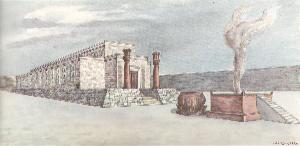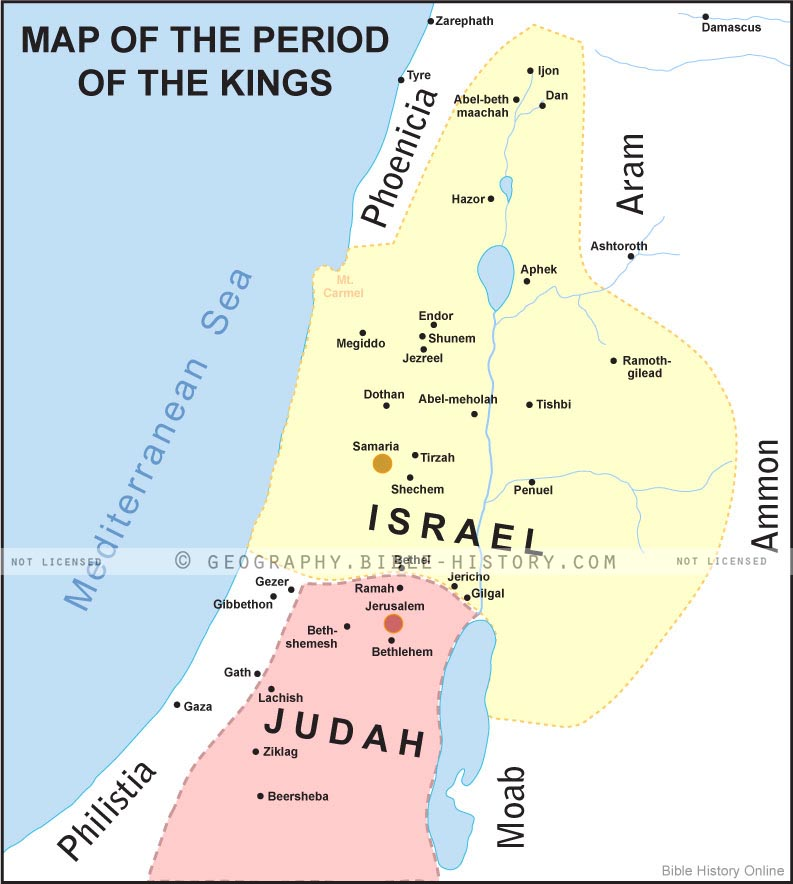After these things, Naboth the Jezreelite had a vineyard, which was in Jezreel, next to the palace of Ahab king of Samaria.
The Books of Kings
1
Kings 2:11 - And the days that David reigned over Israel
[were] forty years: seven years reigned he in Hebron, and thirty
and three years reigned he in Jerusalem.
1 Kings
2:12 - Then sat Solomon upon the throne of David his father;
and his kingdom was established greatly.
1 Kings 8:27 - But will God indeed dwell on the earth? behold, the heaven and heaven of heavens cannot contain thee; how much less this house that I have builded?

Reconstruction of the Temple of Solomon
1 Kings 8;6 - And the priests brought in the ark of the covenant of the LORD unto his place, into the oracle of the house, to the most holy [place, even] under the wings of the cherubims.
The Old Testament - A Brief Overview
Bible Survey - Kings
Hebrew Name - Melechim "kings"
Greek Name - basilia (Greek form of the Hebrew)
Author - Jeremiah (According to Tradition)
Date - From 1015-562 BC Approximately
Theme of 1 Kings - The division of the kingdom
Theme of 2 Kings - The history of Israel and Judah
Types and Shadows - In Kings Jesus is the peaceful King
Ark Relief at Capernaum Synagogue
The ancient Ark of the covenant of Israel is one the most famous items in all of antiquity. There is no trace of the Ark of the covenant, yet it is memorialized by this Scripture block at the synagogue of Capernaum, created in Greco-Roman style. In the Bible the Ark of the Covenant was captured by the Philistines, and later returned because of sudden plagues that happened upon their lands. Through the valley of sorek it was taken back to Israel to Beth-shemesh.
Summary of The Books of Kings
The books of Kings were originally one book in the ancient Hebrew manuscripts, and the writers of the Septuagint divided them. They were called the Third and Fourth Books of Kingdoms, although in the Hebrew manuscript the title was called Kings, exactly the same as we have in our English Bible. The books of Kings follow the books of Samuel chronologically.
The time period extends from the anointing of King Solomon (1015 BC) throughout the history of Israel and Judah all the way to the death of Jehoiachin after he was freed from Babylonian imprisonment (561 BC). The book of 1 Kings begins with Solomon, and not David or Saul because the books of Samuel cover their lives. Under King Solomon the dominion of Israel extended from the Euphrates River all the way to the Mediterranean Sea and down to the Egyptian border (1 Kings 4:21). At the end of each the kingdoms of Israel and Judah the remaining kings were not seeking God and became a sad remnant who were puppets of either Egypt or Assyria or Babylon until they were finally uprooted and taken away. The beginning of all of their problems happened after the death of Solomon when his sons Rehoboam and Jeroboam divided the kingdom, 10 of the tribes went with Jeroboam to the north (Israel), and 2 of the tribes remained with Rehoboam in the south (Judah). All 19 of Israel's Kings followed the heathen nations and were idol worshipers and evil, leading Israel into sin bringing upon themselves the wrath of God. They were destroyed and taken captive to Assyria in 722 BC. In the southern kingdom of Judah 8 out of their 20 Kings sought the Lord and the rest forsook him also bring the wrath of God when the Babylonian captivity took place under King Nebuchadnezzar in 586 BC.
It is difficult to give a precise chronology of the books of Kings. According to Hebrew tradition Jeremiah was the author, and wrote shortly after the events have taken place. The Books of Chronicles record the events of the same time period from a different perspective.
Quick Reference Map

Map of Israel and Judah During the
Period of the Kings (Click to Enlarge)
The books of Kings may be arranged with this quick outline:
Outline of the Books of Kings
I. The Reign of Solomon (1 Kings 1:1 -14:43)
1) The last days of David (1 Kings 1:1-2:11). Adonijah usurps David's throne, but flees
after the anointing of Solomon. David dies and is buried in Jerusalem.
2) Solomon's formal accession to the throne and the early days of his reign
(1 Kings 2:12-46).
3) Solomon's request for wisdom and his sagacious decision concerning the
disputed child (1 Kings 3).
4) A description of Solomon's power, wealth, and wisdom (1 Kings 4). In this section
we learn that Solomon wrote over 3,000 proverbs and 105 songs. For a further
discussion of this, see the introduction to Proverbs.
5) The erection of Solomon's temple (1 Kings 5-8).
6) A further description of the splendor of Solomon's kingdom (1 Kings 9-10). After
mentioning the stables, the navy and the great riches of the kingdom, the
narrative records the visit of the queen of Sheba, who was so impressed by the
scene that she remarked, "Howbeit I believed not the words, until I came, and
mine eyes had seen it; and, behold, the half was not told me: thy wisdom and
prosperity exceedeth the fame which heard" (1 Kings 10:7).
7) Solomon's wives and apostasy (1 Kings 11). One cannot read this chapter seriously
without being saddened. In his search for wealth and pleasure, Solomon
contracted a large number of foreign wives�many, no doubt, for political
reasons. These women brought their foreign deities with them and eventually
Solomon's heart was turned away from the Lord "and his heart was not perfect
with the Lord his God, as was the heart of David his father" (1 Kings 11:4). Whether or
not Solomon was "the preacher" of Ecclesiastes cannot be proved beyond doubt. If
he was, however, surely the situation to which this chapter bears witness would
lead him to the statement of cynicism and despair: "Vanity of vanities, all is
vanity, saith the preacher" (Ecclesiastes 1:2).
II. The Divided Kingdom (1 Kings 12:1-2 Kings 17:41)
1) The division of the kingdom (1 Kings 12). After Solomon's death, his son Rehoboam
became king. Instead of lightening the heavy tax burden which Solomon's
extravagances had forced on the people, Rehoboam decided to increase it.
Disgruntled, the ten northern tribes chose Jeroboam as their leader and seceded
from the union with the tribes of Judah and Benjamin. In order to keep his
people from returning to worship in Jerusalem, where they might be influenced to
stand with Rehoboam, the king of the North instituted the worship of the golden
calf. This act of political expediency was the major factor in Israel's ultimate
humiliation.
2) The remainder of Jeroboam's reign (1 Kings 13:1-14-20). This section includes a
rebuke to Jeroboam by a man of God which contains an amazing prophecy concerning
the reformation of Josiah (v. 2), which was not to be fulfilled for over 300
years (2 Kings 23:15-18).
3) Rehoboam, Abijam and Asa, kings of Judah (1 Kings 14:21-15:24).
4) Kings of Israel from Nadab to Omri (1 Kings 14:25-16:28).
5) Ahab, Jezebel and Elijah (1 Kings 16:29-22:40). These three individuals stand out as
among the more memorable in all the history of Israel, the first two for their
consummate wickedness and the latter for his fiery zeal and courageous efforts
in the service of God. 1 Kings 17 tells of the feeding of Elijah by the ravens and
his boarding at the house of the widow of Zarephath during the three and a half
year drought which was on the land. 1 Kings 18 informs us that Jezebel's wickedness
prompted her to subsidize Baal worship and a cult of heathen prophets, while she
strove to exterminate the prophets of God (verse 13). Also contained in this
chapter is the magnificent story of Elijah's "duel" with the prophets of Baal
atop Mt. Carmel. 1 Kings 19 records the anger of Jezebel at Elijah's having slain
her prophets and her threat upon his life. Elijah is reduced to desperation, but
is comforted by the "still, small voice" (verses 11, 12). 1 Kings 20-22 relate other
incidents concerning Ahab, including his brutal treatment of Naboth and his
death at the hands of the Syrians.
6) Jehoshaphat of Judah (1 Kings 22:41-50).
7) Ahaziah of Israel (1 Kings 22:51-2 Kings 1:18).
8) Elijah's translation and the imparting of his spirit to Elisha (2 Kings 2).
9) Jehoram of Israel (2 Kings 3).
10) The ministry of Elisha the prophet (2 Kings 4-7). Elisha's ministry was
characterized by a considerable number of miracles, including the resurrection
from the dead of the son of the Shunammite woman, the healing of Naaman's
leprosy, and the floating axe head. Ch. 8 records the strange phenomenon of a
prophet's anointing the head of a foreign king to punish the prophet's own
people. Instructions to this effect had been given to Elijah (I Kings 19:15).
11) Jehoram and Ahaziah of Judah (2 Kings 8:16-29).
12) Jehu, king of Israel (2 Kings 9-10). Having been anointed by Elisha to punish the
house of Ahab for its great wickedness, Jehu set about his task with a
frightening zeal. Everything which is known of him can be characterized by the
statement in 2 Kings 9:20:"he driveth furiously."
13) Miscellaneous kings of Israel and Judah (2 Kings 11-16). During his period Israel
reached a period of great prosperity under Jeroboam II, regaining many of the
areas which she had previously lost.
14) The captivity of Israel by Assyria in 722 BC (2 Kings 17). The last king of
Israel was Hoshea. He, like the nineteen kings before him, was guilty of
idolatrous worship. Finally, after repeated efforts by the prophets to turn the
people from their idols, God allowed the ten tribes of Israel to be carried out
of their homeland.
III. The Kingdom of Judah Alone (2 Kings 18-25)
This section contains an account of the last nine kings of Judah and the fall of
Jerusalem. Also see the introduction to the books of Chronicles. Although the
books of Kings contain a great deal of historical material, history is not their
primary concern. In the Hebrew canon, they are classified, along with Joshua,
Judges and the books of Samuel, as "The
Prophets." The message is more
spiritual than political. The writers of these books have written their history
with a focus on
devotion to God, the factual information is mentioned for illustration and
confirmation. Examining the writings of the prophets is important when
researching history,
especially Isaiah and Jeremiah. An intimate acquaintance with these prophets is
essential for a clear grasp of the meaning of these books.
Quick Reference Maps - 1 Kings
The Period of the Kings
The Empire of David and Solomon
The Kingdom of David
Solomon's Temple Illustration
Chart - The House of the LORD
Ophir and Tarshish
Israel and Judah During the Time of Rehoboam
Samaria
Zaraphath and Mount Carmel
Ramoth Gilead
1 Kings Resources
Saul,
Israel's First King
King
David
King
Solomon
The Divided Kingdom
The
Northern Kingdom of Israel
The
Southern Kingdom of Judah
The Assyrian Captivity
The Babylonian Captivity
More About the Book of
1 Kings
More About the Book of
2 Kings
1 Kings in the Picture
Study Bible
2 Kings in the Picture
Study Bible
Timeline of the Ancient
World
Back to the Old Testament
Back to Bible
History Online